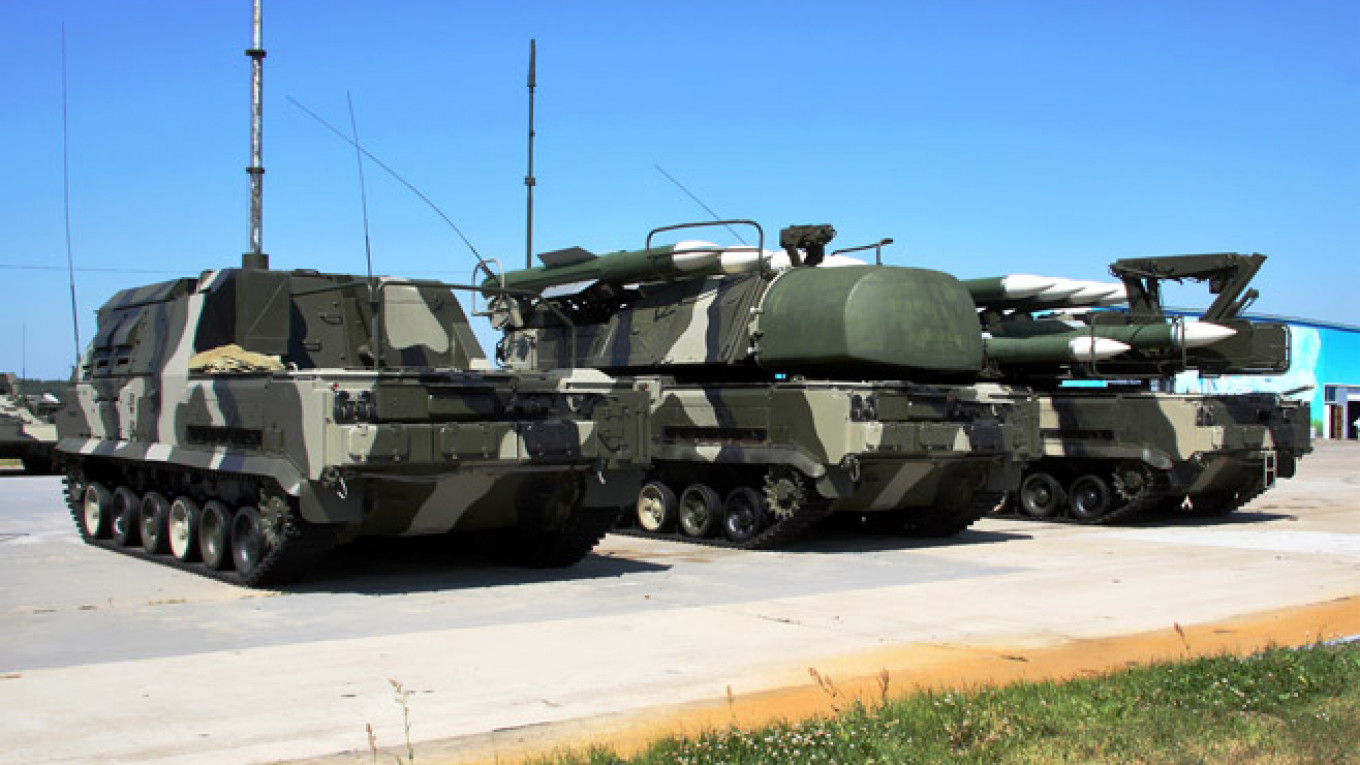As demand for Russian anti-aircraft missiles grows both at home and abroad, Almaz-Antey, the country's leading defense producer, reported a record revenue for the last year on Monday.
Maker of Russia's famous S-300 and S-400 anti-aircraft missile systems, the company increased its revenue in 2013 by more than 40 percent to 272 billion rubles ($7.7 billion), up from $5.7 billion a year before, it said in a statement.
Last year's results had already helped the firm jump past 11 others in the Defense News Top 100 ratings, putting it in the 14th place among the world's leading defense companies. Defense News is a major U.S. media outlet covering global defense industry developments.
A spokesman for Almaz-Antey declined to elaborate on the reasons behind last year's growth and on the current company's order portfolio when reached by The Moscow Times by phone on Monday.
The rapid growth of state defense orders accounted largely for the company's surging revenues, industry analysts said, with the lion's share of it falling on the existing and perspective anti-aircraft missile systems.
"Russia's relations with the West started to cool off long before the Ukrainian crisis began. So it was part of the government's strategic decision to begin purchasing new anti-aircraft defense systems," said Ruslan Pukhov, director of the Russian Center for Analysis of Strategies and Technologies, a Moscow-based private think tank tracking the global defense industry.
State arms and armaments procurement from Almaz-Antey grew by almost 19 percent in 2013, and its exports were boosted by almost 17 percent, it said. The company also reported net profit of 12.7 billion rubles ($361 million), a 144 percent jump from a year earlier.
In 2013, state defense spending grew by 1.4 times and reached 1.3 trillion rubles ($37 billion), Deputy Defense Minister Yuri Borisov said, Interfax-MNA reported in April. Borisov added that the defense budget is expected to grow 30 percent this year.
Among new warplanes, warships and armored cars the military would purchase 14 anti-aircraft systems and 50 radar stations this year alone, Valery Gerasimov, chief of Russia's General Staff, said, RIA Novosti reported in February. Chances are that the company will supply at least part of this order.
"It is already supplying the military with modified S-300 systems, the new S-400 Triumph, caterpillar-based [medium and short-range] Buk M2 and Thor M2, which successfully protected the Olympic Games," said Said Aminov, an independent anti-aircraft systems analyst.
Military forces are also radically modernizing their radio surveillance equipment with new stationary and mobile radars supplied by Almaz-Antey, he added.
Abroad, there is demand for a variety of Almaz-Antey's missiles systems, from short to long-range, other analysts said.
"Without specifying the countries I can name regions such as the Asia-Pacific, Latin America and the Middle East," said Igor Korotchenko, editor-in-chief of National Defense magazine.
The company also produces equipment for civil use, which accounted for part of its revenue, he said. For instance, Almaz-Antey supplied aviation control centers for the Sochi Airport and for the Moscow air hub, Korotchenko added.
Almaz-Antey is undoubtedly Russia's flagship defense company, and it leads not only in terms of revenue and production output levels but also in terms of effectiveness and manufacturing techniques, Korotchenko said.
The concern is building two new factories — in Nizhny Novgorod and Kirov — that will produce the S-500 anti-aircraft systems currently under development.
"In the post-Soviet era this is the first time two new factories are built from scratch for the defense industry applying modern technology and production culture," Korotchenko said.
The design of S-500 is slated for completion by 2015. The new anti-aircraft systems are are to be supplied to the military starting from 2017 to 2018, the head of Almaz-Antey lead design bureau Vitaly Neskorodov told RIA Novosti last year.
Contact the author at a.panin@imedia.ru
A Message from The Moscow Times:
Dear readers,
We are facing unprecedented challenges. Russia's Prosecutor General's Office has designated The Moscow Times as an "undesirable" organization, criminalizing our work and putting our staff at risk of prosecution. This follows our earlier unjust labeling as a "foreign agent."
These actions are direct attempts to silence independent journalism in Russia. The authorities claim our work "discredits the decisions of the Russian leadership." We see things differently: we strive to provide accurate, unbiased reporting on Russia.
We, the journalists of The Moscow Times, refuse to be silenced. But to continue our work, we need your help.
Your support, no matter how small, makes a world of difference. If you can, please support us monthly starting from just $2. It's quick to set up, and every contribution makes a significant impact.
By supporting The Moscow Times, you're defending open, independent journalism in the face of repression. Thank you for standing with us.
Remind me later.






